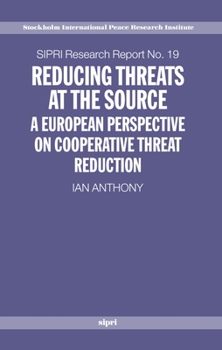Reducing Threats at the Source: A European Perspective on Cooperative Threat Reduction
Select Format
Select Condition 
Book Overview
In 2002 the Group of Eight industrialized nations - in which Canada, France, Germany, Italy, Japan, Russia, the UK, the USA and representatives of the European Union participate - formed the Global Partnership Against the Spread of Weapons and Materials of Mass Destruction. The G8 pledged to raise up to $20 billion to carry out the Global Partnership projects over a 10-year period, initially in Russia but with the intention to expand the scope of projects to include other countries. These projects will help to specify the quantities and locations of weapons and materials and ensure that stocks are held under safe and secure custody to prevent diversion to unauthorized users or inappropriate uses. If the weapons or materials are not required, this practical assistance can also help to eliminate the surplus. The G8 initiative is only one of a number of activities sharing the same basic features: tailor-made measures jointly implemented on the territory of one state by a coalition including states, international organizations, local and regional governments, non-governmental organizations and the private sector. This report reviews the current cooperative threat reduction activities with a particular focus on projects and approaches engaging European partners. It examines the organizing principles for cooperative threat reduction and the lessons learned from past project implementation. Finally, it examines how European countries might organize their cooperative threat reduction activities to increase their coherence and effectiveness.
Format:Hardcover
Language:English
ISBN:0199271771
ISBN13:9780199271771
Release Date:July 2004
Publisher:Oxford University Press, USA
Length:136 Pages
Weight:0.70 lbs.
Dimensions:0.4" x 5.5" x 8.5"
Customer Reviews
0 rating





